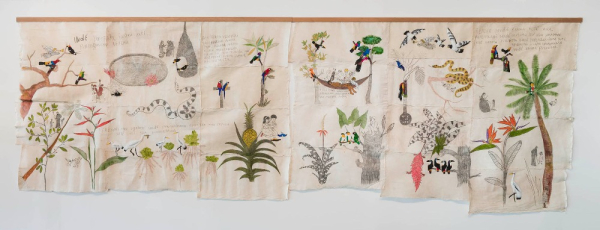Denilson Baniwa

Nascido em Barcelos, no interior do Amazonas, Denilson Baniwa é indígena do povo Baniwa. Atualmente, vive e trabalha em Niterói, no Rio de Janeiro. Como ativista pelo direito dos povos indígenas, realiza palestras, oficinas e cursos, atuando fortemente nas regiões sul e sudeste do Brasil e também na Bahia desde 2015. Além de artista visual, Denilson é também publicitário, articulador de cultura digital e hackeamento, contribuindo na construção de uma imagética indígena em diversos meios como revistas, filmes e séries de tv. Em 2023 inaugura a individual “Moqueca de Maridos” n’A Gentil Carioca de São Paulo, participa da 35ª Bienal de São Paulo - "coreografias do impossível", da primeira edição da Bienal das Amazônias - Belém do Pará, e ocupa o octógono da Pinacoteca de São Paulo com a instalação "Escola Panapaná". Em 2022 apresentou sua primeira exposição individual n'A Gentil Carioca, "Frontera", e curou a exposição "Nakoada" no Museu de Arte Moderna do Rio de Janeiro. Em 2021, apresentou a individual "Inípo - Caminho da Transformação" no Instituto Goethe, em Porto Alegre. Em 2018 realizou a mostra “Terra Brasilis: o agro não é pop!”, na Galeria de Arte da Universidade Federal Fluminense, também em Niterói, como parte do projeto “Brasil: A Margem”, promovido pela universidade. No mesmo ano, participou da residência artística da quarta edição do Festival Corpus Urbis, realizada no Oiapoque, no Amapá. Esteve em exposições no CCBB, Pinacoteca de São Paulo, CCSP, Centro de Artes Hélio Oiticica, Museu Afro Brasil, MASP, MAR e Bienal de Sidney. Em 2019 venceu o Prêmio Pipa na categoria online e em 2021 foi um dos vencedores indicados pelo júri. Às vezes o desafio não é ocupar posições. Quando as que existem não servem, é necessário criar algo novo. Denilson Baniwa é um artista indígena; é indígena e é artista, e seu ser indígena lhe leva a inventar um outro jeito de fazer arte, onde processos de imaginar e fazer são, por força, intervenções em uma dinâmica histórica - a história da colonização dos territórios indígenas que hoje conhecemos como Brasil - e interpelações àqueles que o encontram a abraçar suas responsabilidades. [Born in Barcelos, in the interior of Amazonas, Denilson Baniwa is indigenous to the Baniwa people. He currently lives and works in Niterói, Rio de Janeiro. As an activist for the rights of indigenous peoples, he gives lectures, workshops and courses, acting strongly in the southern and southeastern regions of Brazil and also in Bahia since 2015. In addition to being a visual artist, Denilson is also an advertiser, articulator of digital culture and hacking, contributing to the construction of an indigenous imagery in various media such as magazines, ?lms and TV series. In 2023, he inaugurates the solo show “Moqueca de Maridos” at A Gentil Carioca in São Paulo, participates in the 35th Bienal de São Paulo - "choreographies of the impossible", in the first edition of the Bienal das Amazônias - Belém do Pará, and occupies the octagon of the Pinacoteca de São Paulo with the installation "Escola Panapaná". In 2022, he presented his first solo exhibition at A Gentil Carioca, "Frontera", and curated the exhibition "Naokoada" at the Museum of Modern Art in Rio de Janeiro. In 2021, he presented the individual "Inípo - Caminho da Transformação" at the Goethe Institute, in Porto Alegre. In 2018, he held the exhibition “Terra Brasilis: agro is not pop!”, at the Art Gallery of the Universidade Federal Fluminense, also in Niterói, as part of the project “Brasil: A Margem”, promoted by the university. In the same year, he participated in the artistic residency of the fourth edition of the Corpus Urbis Festival, held in Oiapoque, Amapá. He has been in exhibitions at CCBB, Pinacoteca de São Paulo, CCSP, Centro de Artes Hélio Oiticica, Museu Afro Brasil, MASP, MAR and Sidney Biennale. In 2019 he won the Pipa Award in the online category and in 2021 he was one of the winners nominated by the jury. Sometimes the challenge is not to occupy positions. When the existing ones don't work, it is necessary to create something new. Denilson Baniwa is an indigenous artist; he is indigenous and he is an artist, and his being indigenous leads him to invent other ways of making art, where processes of imagining and making are, by force, interventions in a historical dynamic - the history of the colonization of indigenous territories that we know today as Brazil - and interpellations to those who ?nd him to embrace their responsibilities.]